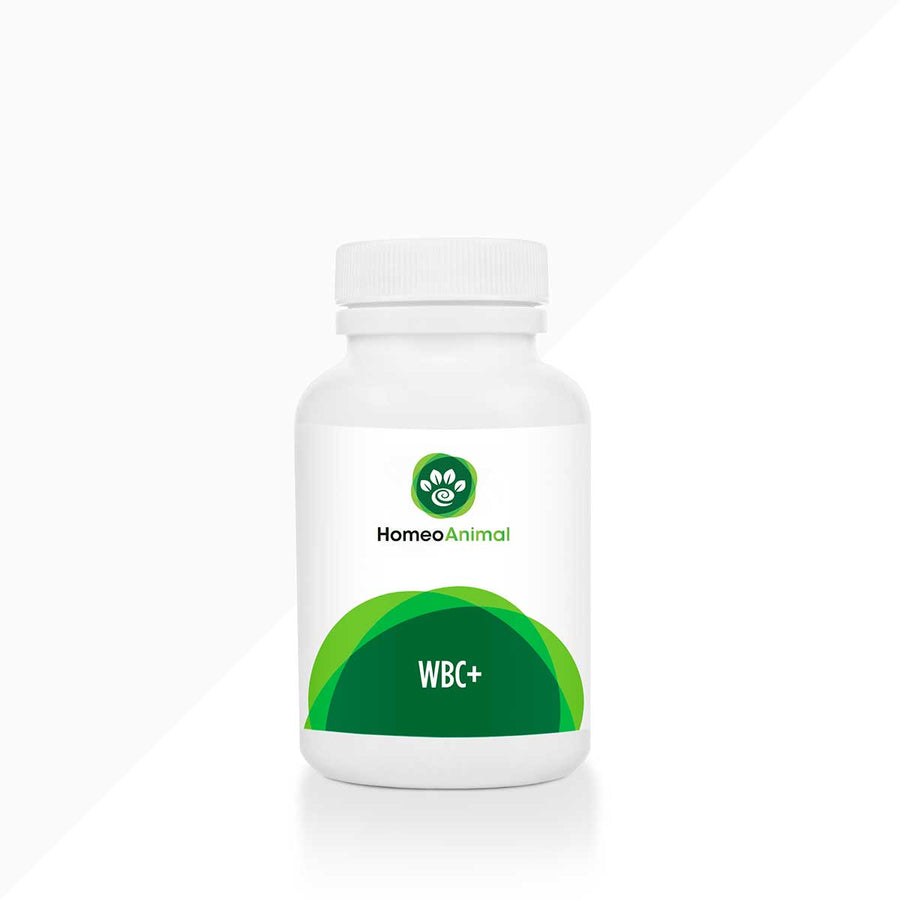5 Best Foods to Increase Your Dog's White Blood Cell Count
Did you know that your dog's white blood cells are directly connected to its overall immune system health? A dip in your pet's white blood cell count can lead to health issues before you even realize it.
In this blog post, I'll walk you through the importance of white blood cells in your dog's body. I'll also share some foods that can help stimulate your pet's body to produce white blood cells at an ideal level. Let's get started!
What Vital Role Do White Blood Cells Play?

Technically referred to as leukocytes, white blood cells help a dog's body fend off health problems like allergic reactions, inflammation, and infections. They also act as immune response regulators, boosting your pet's ability to protect itself during illness and disease.
White blood cells, such as lymphocytes and neutrophils, play a crucial role in safeguarding your dog from health challenges like parasitic, bacterial, and viral infections. They also protect against foreign particles that can cause inflammation. Maintaining an optimal white blood cell count is essential for your dog's immune system to effectively combat these threats.
Additionally, white blood cells work in conjunction with red blood cells. Red blood cells are responsible for transporting oxygen and nutrients, as well as removing waste and carbon dioxide.
Where are White Blood Cells Produced in a Dog's Body?
White blood cells are produced in four key areas of a dog's body: the bone marrow, the thymus, the lymphatic system, and the spleen. These cells play a crucial role in maintaining a healthy immune system.
However, autoimmune disorders and health problems such as Cushing's disease, diabetes mellitus, and leukemia can hinder your pet's ability to produce adequate levels of white blood cells.
Bone marrow issues can cause fluctuations in white blood cell counts.
Although the bone marrow is generally known for storing fat reserves, producing stem cells, and maintaining bone health, it also plays a crucial role in generating both white and red blood cells.
Consequently, bone marrow diseases and related health issues, such as leukemia and anemia, can lead to either an abnormally high or low white blood cell count. To diagnose this, a veterinarian must administer a complete blood count and blood test.
The procedures used to measure blood cells include the "leukocyte count" for white blood cells and the "erythrocyte count" for red blood cells.
Is a Low White Blood Cell Count in Dogs a Cause for Concern?
The short answer is yes.
If your dog has a low white blood cell count, also known as leukopenia, it could indicate a health problem such as an infection, bone marrow disease, immune disorder, or other issues like parvovirus or ehrlichiosis.
Additionally, severe nutritional deficiencies, particularly in vitamin B12 or folic acid, can also lead to a drop in white blood cells. This condition not only makes your dog more susceptible to diseases and illnesses but can also result in chronic inflammation if left untreated.
How about too high white cell count in dogs?
An abnormally high white blood cell count may indicate underlying health issues in your pet, such as severe allergies, inflammatory bowel disease, or even cancer in dogs.
Additionally, elevated white blood cell counts can be a sign of severe physical or emotional stress following a traumatic experience, and may also be a side effect of certain conventional veterinary medications.
What Are the Symptoms of Low White Blood Cell Count in Dogs?
In this part of our discussion, we will cover common indicators that your dog's white blood cell count may be dipping. Early detection of these signs can be crucial for your pet's health, so it is essential to consult with a vet or a pet wellness expert if you notice any of the following symptoms:
- Sudden loss of appetite or change in eating habits
- Unexplained weight loss
- Pale gums
- Bouts of nausea, vomiting, and diarrhea
- Swelling of the lymph nodes
- Sudden lethargy and weakness
- Increased vulnerability to illnesses and diseases
- Respiratory issues
It's important to emphasize that most dogs are very good at hiding their pain and discomfort. This is why regular examinations and monitoring of your pet are crucial. Getting a complete blood count and blood test from a veterinarian can help detect issues early and ensure your dog stays healthy.
Which Foods Help Stimulate Ideal White Blood Cell Counts?
As a pet homeopathy expert, I have discovered that certain foods can help boost a dog's white blood cell count. These foods not only delight your pet's taste buds but also come without the adverse side effects associated with some medications.
In this section, we will explore the foods that can support your canine companion if they experience a decrease in white blood cell count. The exciting part is that you might already have these beneficial foods in your kitchen or pantry.
Yogurt
Research reveals that yogurt helps boost natural killer (NK) cell activity, which plays a key role in staving off bacterial infections and other diseases, thereby improving the overall immune response.
To stimulate white blood cell production in your dog's body, opt for plain, low-fat varieties of yogurt. Flavored yogurts should be avoided, as they often contain high amounts of sugar and fat, which are not suitable for dogs.
You can serve yogurt directly or mix it with your dog's food. A teaspoon a day is sufficient to provide health benefits.
Red bell pepper
A study indicates that red bell peppers can boost the production of immunoglobulins, vital components of white blood cells. These immunoglobulins are essential for combating infections, thereby supporting a robust immune system.
To incorporate red bell peppers into your dog's diet for enhanced white blood cell production, select fresh peppers. Thoroughly wash them and remove the stems and seeds. Be sure to slice them into small pieces as well.
Although you can serve raw red bell pepper to your dog, roasting, grilling, or lightly steaming them without seasoning often makes them more palatable. A daily tablespoon of red bell pepper is sufficient to provide these benefits.
Blueberries
While blueberries have been proven to help relieve inflammation and oxidative stress, research also shows that they can increase natural killer (NK) cell counts, which fight against parasitic and fungal infections.
To help boost your dog's NK cell levels and overall health, you can incorporate blueberries into their diet. Wash them thoroughly first to remove any dirt and debris. They can be served directly or mixed with your pet's food. About a handful (approximately 10-15) of blueberries daily is sufficient.
Fish oil
Besides enhancing your pet's ability to protect itself from inflammation, fish oil also helps improve skin and coat health in dogs, according to a study. Additionally, it benefits neurological development in puppies.
To boost your dog's white blood cell count using fish oil, choose fatty fish like anchovies, herring, mackerel, sardines, and salmon. Be sure to remove all the bones and cook the fish plainly.
For smaller dogs, a maximum of 2 to 3 ounces of fatty fish per week is recommended, while larger breeds can have up to 4 to 6 ounces per week.
Green tea
Green tea is rich in compounds called "catechins," epigallocatechin gallate (EGCG), which are known for their health benefits, including potential anti-cancer properties.
To help stimulate more white blood cells in your dog, you can brew green tea for no more than 5 minutes. This ensures the release of its antioxidant compounds without making the tea bitter.
To reduce the caffeine content, dilute the brewed tea with a bit of water. It's important to limit your dog's intake to up to 2 tablespoons per week to ensure safety and efficacy.
Consider This Natural Product to Boost Your Dog's White Blood Cells
Zumalka's WBC+ is designed to help maintain a healthy white blood cell count and support your pet's immune system. This natural product can be used alongside traditional treatments, enhancing your pet’s ability to combat various diseases and conditions.
Additionally, WBC+ is a valuable source of essential minerals like calcium, phosphorus, and magnesium. Having WBC+ on hand ensures your pet receives these vital nutrients, contributing to their overall well-being.







Hi Marie, Thanks for reaching out to us about your dog! I’ve sent you an email to get some more information from you in order to help him best.
My small 13 month dog had a liver shunt surgery and bladder stone removal now his white blood cells are very hight
Hi Tammy, We have reached out to you by email to get some personalized help for your dog from our Homeopath. Please respond to the questions in the email so we can help you better.
my dog needs her red and white blood cells rised and her blood sugar but she will not eat or drink i been watering her and feed ing by a syring
Hi Denise,
I’m sorry to hear that your dog is not feeling well! Please answer the questions in the email we sent you to receive some personalized help from our Homeopath.
Leave a comment